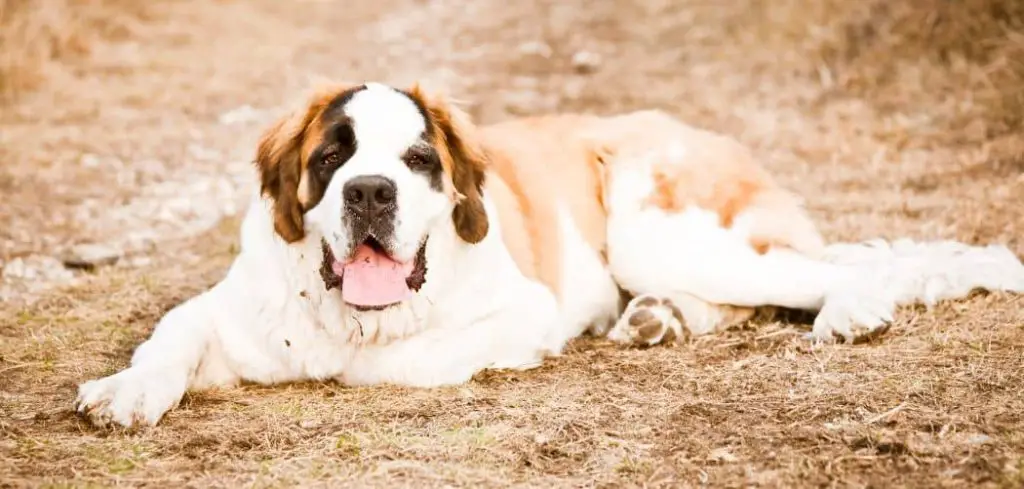Seeing your dog panting with their mouth open can be concerning, especially if it occurs frequently or in unusual situations.
Panting is a normal cooling mechanism for dogs, but persistent open-mouth panting may indicate discomfort or an underlying medical issue.
We outline the common causes of panting with the mouth open in dogs, what you can do at home, and when to seek veterinary help.
Table of Contents
Dog Panting and Mouth Open — Why It Happens
Dogs naturally pant with their mouths open to regulate body temperature, but if it seems excessive or unusual, it may point to overheating, stress, or respiratory problems. Panting with an open mouth can also occur with pain, heart disease, or after strenuous activity.

Dog Panting and Mouth Open: Common Causes
Heat and Overheating
Heat is one of the most common reasons dogs pant with their mouth open. Dogs regulate their body temperature primarily through panting, and an open mouth allows them to cool more efficiently.
Signs of overheating include excessive drooling, bright red tongue, lethargy, and seeking cool surfaces.
Overheating can escalate to heatstroke, a serious condition, so it’s essential to provide shade, fresh water, and avoid intense exercise in hot weather.
Stress and Anxiety
Stress or anxiety can cause open-mouth panting even in a cool environment. Dogs experiencing fear, separation anxiety, or environmental changes may pant heavily with their mouths open while appearing restless.
Other behaviors may include pacing, whining, trembling, or hiding.
Managing stress through a calm routine, safe spaces, and comfort measures can reduce open-mouth panting, but chronic anxiety may require professional behavioral support.
Read more: Dog Panting and Mouth Watering (Here’s why)
Pain or Discomfort
Pain often triggers panting as a coping mechanism. Dogs in pain—whether from injuries, arthritis, or internal discomfort—may keep their mouths open while panting to self-soothe.
You may notice restlessness, reluctance to lie down, changes in posture, or vocalizations.
Pain-related panting should be addressed promptly with veterinary guidance to prevent worsening discomfort and improve quality of life.
Heart or Respiratory Issues
Heart or lung problems can cause panting with the mouth open. Conditions such as congestive heart failure, heart murmurs, or respiratory diseases reduce oxygen efficiency, leading dogs to pant more to meet oxygen needs.
Accompanying signs can include coughing, fatigue, rapid breathing, blue-tinged gums, or exercise intolerance. Early veterinary evaluation is critical, as cardiac and respiratory conditions can worsen quickly without treatment.
Fever or Infection
Infections and fevers often lead to open-mouth panting. When a dog has a fever, their body tries to dissipate heat, causing increased panting. Respiratory infections, urinary tract infections, or systemic illness can trigger these symptoms.
Watch for lethargy, loss of appetite, vomiting, or diarrhea alongside panting. Veterinary attention is necessary to identify and treat the underlying infection.
Medications and Toxins
Certain medications or exposure to toxins can cause panting. Drugs that affect heart rate, blood pressure, or metabolism may increase panting as a side effect.
Ingesting toxic substances like chocolate, medications meant for humans, or plants can also trigger panting.
Signs may include vomiting, drooling, restlessness, tremors, or changes in behavior. Immediate veterinary care is essential in cases of suspected poisoning or adverse drug reactions.
Obesity or Poor Fitness
Overweight or unfit dogs may pant excessively with their mouths open. Extra body weight increases the effort required for movement and heat regulation, making dogs more prone to panting even during mild activity.
You might notice shortness of breath, reluctance to exercise, or fatigue. A gradual weight management plan, proper diet, and supervised exercise can help reduce panting and improve overall health.
What to Do If Your Dog Is Panting and Mouth Open
Ensure your dog has access to a cool, shaded area and fresh water. This helps manage normal panting and prevents overheating.
Observe and record episodes. Note when panting occurs, how long it lasts, and any accompanying signs. This information is invaluable for veterinary assessment.
Establish a calm environment. Minimize stressors such as loud noises, strangers, or household chaos, especially if anxiety may be contributing.
Address minor discomfort at home. Supportive bedding, gentle massage, and monitoring activity levels can reduce pain-related panting. Avoid forcing exercise if your dog shows signs of distress.
Consult a veterinarian if panting persists, worsens, or is accompanied by concerning symptoms. Follow treatment plans and recommendations for underlying conditions.
When to Call or Visit Your Vet
Seek veterinary care immediately if your dog shows:
Persistent open-mouth panting, especially at rest
Signs of pain, weakness, or lethargy
Vomiting, diarrhea, or sudden loss of appetite
Coughing, labored breathing, or blue-tinged gums
Tremors, seizures, or sudden behavioral changes
Prompt evaluation ensures early detection and management of potential medical conditions, keeping your dog safe and comfortable.
Read more: Dog Panting and Foaming at Mouth (Here’s why)
Key Takeaway
Panting with the mouth open can be normal in dogs during heat or exercise but may also indicate stress, pain, heart or respiratory issues, fever, medication effects, or obesity.
Monitoring your dog, maintaining a calm environment, and consulting a veterinarian when needed are essential steps.
Early attention helps prevent complications, reduce discomfort, and support your dog’s overall well-being.
